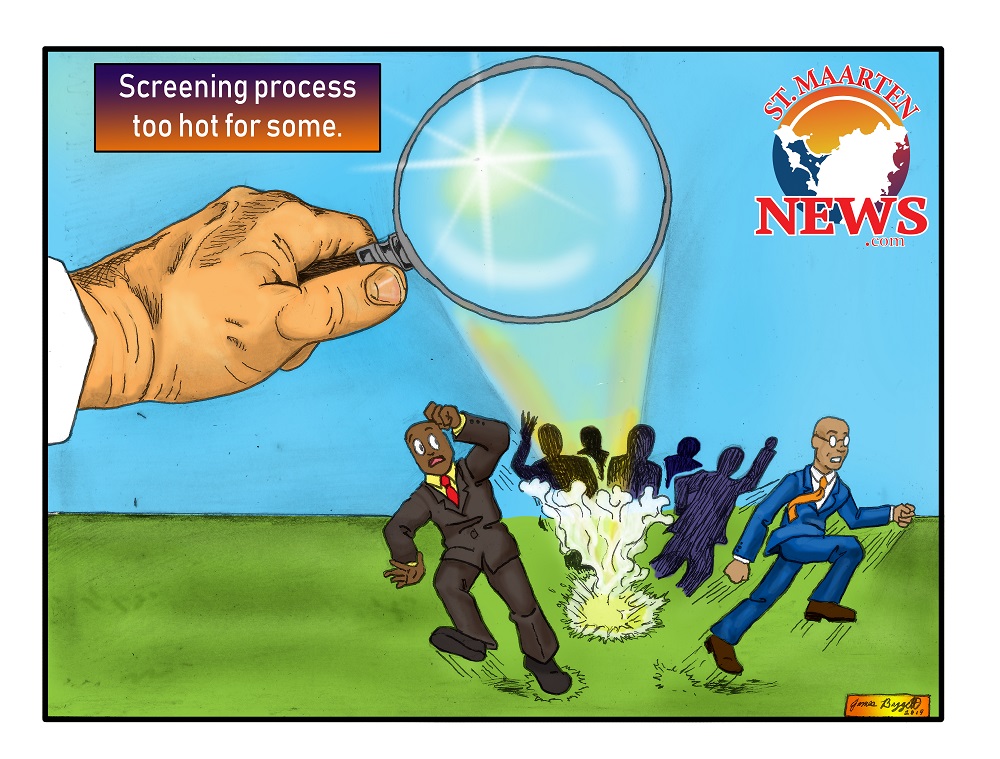Debate about screening of candidate-ministers comes back to life

PHILIPSBURG — After every elections the same issue comes up: criticism of the screening of candidate-ministers. Whether this is justified or just sour grapes from candidates that did not make the cut remains an open question. Fact: in January 2013 then Prime Minister Sarah Wescot-Williams stated that is is important for St. Maarten to establish its own national laws governing the screening of ministers. Eleven year down the road those laws remain a pipe dream.
Time for change? Yes. Maybe. Complaints that the screening process is “obscure’ have no merit because this process is per definition confidential though in St. Maarten leaks followed by questionable melee are considered business as usual.
Mirto Murray, an attorney working for SMS Attorneys at Law in Curacao and the chairman of the editorial board of Caribisch Juristenblad made a detailed analysis of the screening process in all the countries in the Kingdom. His conclusion: Curacao has the strictest rules and the other countries would do well to make it part of their own legislation.
In October 2014 a Royal Decree signed by King Willem-Alexander and minister of Kingdom Relations Ronald Plasterk got the attention of Carribbean politicians, in particular those in St. Maarten. In the August 2014 elections the United People’s party, led by Theo Heyliger, won 7 of the available 15 seats in parliament. Fearing that Heyliger would become the next prime minister, Plasterk sprang into action, leading to the Royal Decree in October of that year. The decree ordered the Governor to withhold the appointment of ministers until the completion of an investigation into the ministeriability of candidates. The decree expired before the 2016 elections.
Murray notes that as a result of this, there is a gap in the proper screening of candidate-ministers in St. Maarten.
The discussion about the screening process has come back to life after the most recent elections. Some voices promote leaving the screening to political parties or to the parliament without indicating what such a process ought to look like.. It sounds like a sensible idea because it could prevent candidate-ministers from failing the current screening process. Currently, candidates don’t have to go through the screening process if they do not want to. The investigation into their background only takes place if they give permission for it. But if you want to become a minister you will have to go through that process.
 Outgoing Prime Minister Silveria Jacobs said in a radio interview with Wendell Moore that St. Maarten can determine how candidate-ministers will be screened. That sounds like good news but everything depends of course of the rules that are put in place. Jacobs wants to do away with obscurity in the process, saying: “Integrity is integrity.”
Outgoing Prime Minister Silveria Jacobs said in a radio interview with Wendell Moore that St. Maarten can determine how candidate-ministers will be screened. That sounds like good news but everything depends of course of the rules that are put in place. Jacobs wants to do away with obscurity in the process, saying: “Integrity is integrity.”
That is an undeniable fact, but the rules to determine levels of integrity differ per country. Curacao has the strictest rules. These include a mandatory drugs-test, but there is no test for excessive alcohol-use. All countries, with the exception of St. Maarten include a fiscal investigation in their screening-rules. Curacao is the only country where the formateur is also subjected to screening.
Murray proposes a clear road towards improving the screening process and making it uniform in al countries in the Kingdom. He suggests combining the Landsverordening Integriteitsbevordering Ministers (the law that promotes integrity among candidate-ministers) with the expired Royal Decree. Another suggestion is to “export” Curacao’s screening model.
Murray furthermore notes that there are shortcomings in the screening-legislation on the Caribbean islands. He recommends amending the local constitutions to enable establishing conditions by national decree for the appointment of ministers.
There is enough information out there about the current shortcomings of the screening process so politicians in St. Maarten do not have to re-invent the wheel – if they want to create a process that is solidly anchored in unambiguous legislation.
###
Related links:
Screenshot DutchCaribbeanLegalPortal news from January 2013
Screening Ministers Review by Mirto Murray (including screening matrix)
Column Terrance Rey: Screening process screams for reform
StMaartenNews.com news archive about ‘screening’>>>
Part 1 – https://www.facebook.com/pmsilveriajacobs/videos/984436296402220
###
ADVERTISEMENT



























